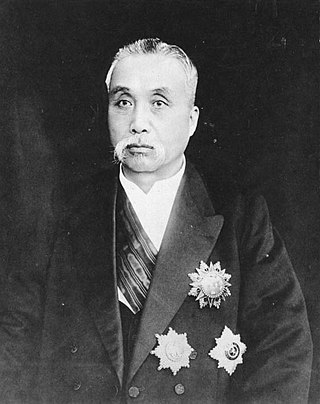
Yuan Shikai was a Chinese general and statesman who served as Prime Minister of the Imperial Cabinet, the second provisional president of the Republic of China, head of the Beiyang government from 1912 to 1916 and Emperor of China from 1915 to 1916. A major political figure during the late Qing dynasty, he spearheaded a number of major modernisation programs and reforms and played a decisive role in securing the abdication of the Xuantong Emperor in 1912, which marked the collapse of the Qing monarchy and the end of imperial rule in China.

The National Assembly was the authoritative legislative body of the Republic of China, from 1947 to 2005. Along with the Control Yuan and the Legislative Yuan, the National Assembly formed the tricameral parliament of the Republic of China.

Xu Shichang was a Chinese politician who served as the President of the Republic of China, in Beijing, from 10 October 1918 to 2 June 1922. The only permanent president of the Beiyang government to be a civilian, his presidency was also the longest of the Warlord Era. Previously, he was Minister of the Cabinet of the Imperial Cabinet during the Qing Dynasty.

Li Yuanhong (Chinese: 黎元洪; pinyin: Lí Yuánhóng; Wade–Giles: Li2 Yüan2-hung2; courtesy name 宋卿; Sòngqīng; Sung4-ch'ing1; October 19, 1864 – June 3, 1928) was a prominent Chinese military and political leader during the Qing Dynasty and the Republic of China. He was the Provisional Vice President of the Republic of China from 1912 to 1913 as well as the president of the Republic of China between 1916 and 1917, and between 1922 and 1923.

The Beiyang Army, named after the Beiyang region, was a combined large army, Western-style Imperial Chinese Army established by the Qing dynasty government in the late 19th century. It was the centerpiece of a general reconstruction of Qing China's military system. The Beiyang Army played a major role in Chinese politics for at least three decades and arguably right up to 1949. It made the Xinhai Revolution of 1911 possible, and, by dividing into warlord factions known as the Beiyang Clique, ushered in a period of regional division.

Five Races Under One Union was one of the major principles upon which the Republic of China was founded following the 1911 Revolution. Its central tenet was the harmonious existence under one nation of what were considered the five major ethnic groups in China: the Han, the Manchu, the Mongols, the Hui (Muslims), and the Tibetans.

The Beiyang government was the internationally recognized government of the Republic of China between 1912 and 1928, based in Beijing. It was dominated by the generals of the Beiyang Army, giving it its name.

The National Protection War, also known as the Anti-Monarchy War, was a civil war that took place in China between 1915 and 1916. Following the overthrow of the Qing dynasty three years previously, the Republic of China was established in its place. The war was caused by President Yuan Shikai's proclamation of the Empire of China, with himself as the Hongxian Emperor.
The Chinese Revolution can refer to:

Duan Qirui was a Chinese warlord, politician and commander of the Beiyang Army who ruled as the effective dictator of northern China in the late 1910s. He was the Premier of the Republic of China on four occasions between 1913 and 1918, and from 1924 to 1926 he served as acting Chief Executive of the Republic of China in Beijing.

The 1912 Chinese National Assembly elections, held in December 1912 to February 1913, were the first nation-wide elections for the newly founded National Assembly of the Republic of China, which was a bicameral parliament with a Senate and a House of Representatives. This assembly was called by the Chinese the Old Congress (laoguohui) to differentiate it from the future assemblies.

The Republic of China (ROC) began as a sovereign state in mainland China on 1 January 1912 following the 1911 Revolution, which overthrew the Manchu-led Qing dynasty and ended China's imperial history. From 1927, the Kuomintang (KMT) reunified the country and ruled it as a one-party state and made Nanjing the national capital. In 1949, the KMT-led government was defeated in the Chinese Civil War and lost control of the mainland to the Chinese Communist Party (CCP). The CCP established the People's Republic of China (PRC) while the ROC was forced to retreat to Taiwan and retains control over the "Taiwan Area"; the political status of Taiwan remains in dispute to this day.
Republic of China is the official name of Taiwan, a country in East Asia.

The 1912 Chinese provisional presidential election were the elections held on 15 February and 20 February 1912 in Nanjing for the second provisional President and Vice President of China.

The Da-Qing Bank, also known as the Great Qing Bank, or previously Hubu Bank, was a state-controlled entity established by the Qing dynasty in 1905 to serve as Imperial China's first central bank. It issued banknotes that were intended to unify the Qing dynasty's currency system. In 1912 following the Xinhai Revolution, the Bank of China was created to take over the role of the Da-Qing Bank, which was liquidated in an orderly manner.

The banknotes of the Da-Qing Bank were intended to become the main form of paper money of the Qing dynasty following the bank's establishment in 1905. The Da-Qing Bank had branches throughout China and many of its branches outside of its headquarters in Beijing also issued banknotes.
The National Assembly was the legislative branch of the Beiyang government during the Republican era of Chinese history. The National Assembly was first founded in 1913, following the overthrow of the previous Qing dynasty, as the first free democratic legislature in Chinese history. It was disbanded less than a year later as President Yuan Shikai assumed dictatorial power and declared himself the Emperor of China. During the Warlord Era, the National Assembly was resurrected and disbanded more than once as different warlords vied for power and legitimacy.
The Imperial Edict of the Abdication of the Qing Emperor was an official decree issued by the Empress Dowager Longyu on behalf of the six-year-old Xuantong Emperor, the last emperor of the Qing dynasty of China, on 12 February 1912, as a response to the Xinhai Revolution. The revolution led to the self-declared independence of 13 southern Chinese provinces and the subsequent peace negotiation between the rest of Qing China and the collective of the southern provinces.

The Articles of Favourable Treatment of the Great Qing Emperor after His Abdication, also known simply as the Articles of Favourable Treatment, was an agreement drawn up by the Qing dynasty government and the Provisional Government of the Republic of China on the relevant protection measures after the abdication of the Qing imperial family and the Xinhai Revolution. The document is dated 26 December, 1914.












